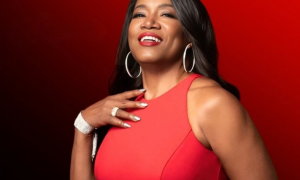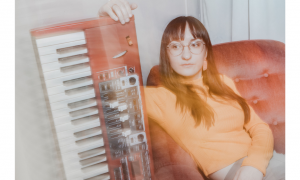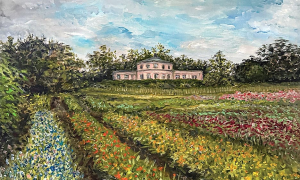The more I looked at the group photo taken of the All-Stars, the less Caceres' inclusion made sense. Could readers of Metronome magazine in 1948 really have voted Ernie Caceres as their favorite baritone player? Ahead of the other more powerful baritones that year? For years I had assumed the musicians in this photo were the 1948-49 poll winners. Was I wrong?
On Saturday, I grabbed the phone and called legendary jazz writer and friend Ira Gitler. “How could Caceres have beaten out the giants? And if he didn't win, how did he wind up on the date?" I asked.
“Metronome magazine had a contract with RCA to record," Ira said. “If the top vote-getters couldn't make it, the editors would go down the poll lists and find musicians who could."
So Caceres had to have been a stand-in for the baritone poll winner. And if so, which other members of this amazing ensemble were second or third choices--and why? When I got off the phone with Ira, I searched the web for a master list of Metronome poll winners but came up empty. No one seems to have put together this list online yet.
I called Ira back and asked if he had a list of the 1948-49 winners. “Come on over," he said. “I have all the Metronome issues from those years."
A half hour later, I was standing on a tall ladder in Ira's apartment coaxing the heavy Metronome 1948-1951 bound volume down from a high shelf. Blowing off the dust, we opened the green book to the January 1949 issue [pictured]. I gingerly turned the pages to the section featuring capsule profiles of the winners and how other musicians stacked up in the voting. (By the way, the cover headlines say, “Winners Big and Small: Kenton and Ventura" and “Modernists Take Over: All Stars, All Progressive.")
As I suspected, Caceres was not the No. 1 baritone. Serge Chaloff won that year, followed by Harry Carney. Caceres was No. 6. A solid sight-reader with years of studio experience, Caceres was obviously the only one who answered his phone the day Metronome booked the session for January 3, 1949.
Who else might have been a last-minute sub? I looked down the lists of other poll winners, and here's what I discovered:
Trumpet. Dizzy Gillespie did indeed finish first with 962 votes, separated from No. 2 by a whopping 685-vote difference, which is no surprise. In second place was Howard McGhee (277), followed by Miles Davis (147) and Fats Navarro (138). Miles ahead of Fats! The rest of the top-10 finalists, in order, were Charlie Shavers, Roy Eldridge, Harry James, Louis Armstrong, Red Rodney and Chico Alvarez. Conte Candoli was No. 11.
Alto saxophone. Charlie Parker ran away with the votes and was followed in the alto category by Johnny Hodges, Willie Smith, Art Pepper, George Weidler (who was with Stan Kenton at the time), Sonny Stitt, Charlie Kennedy, Benny Carter, Lee Konitz and Boots Mussulli (with Charlie Ventura). Bird scored 1,058 votes (more than any other winner in any category), with Hodges receiving 393 at No. 2.
Tenor saxophone. Charlie Ventura was the winner, followed by Flip Phillips, Coleman Hawkins, Wardell Gray, Illinois Jacquet, Allen Eager, Vido Musso, Bob Cooper, Lester Young and Stan Getz. Dexter Gordon was No. 11.
Baritone saxophone. With Chaloff at No. 1 and Carney at No. 2, how did the rest of the top 10 shake out? The list continued with Leo Parker, Bob Gioga, Charlie Ventura (who frequently doubled on baritone), Ernie Caceres, Paul Williams (an exciting blues and r&b player), Deane Kincaide (who was with Ray McKinley at the time), Bob Poland (Harry James) and Butch Stone (Les Brown). Gerry Mulligan at No. 11? “Don't forget, Gerry was still known as an arranger then," Ira noted. “Singles from Capitol's 'Birth of the Cool' session hadn't come out yet, and he didn't move to California until '52."
Clarinet. Benny Goodman won, narrowly edging out Buddy DeFranco by just 25 votes. The rest of the vote-getters on the list were Stan Hasselgard (who had died in November 1948 in a car crash), Woody Herman, Jimmy Hamilton, Artie Shaw, Barney Bigard, John LaPorta, Herbie Fields and Hank d'Amico.
Trombone. Bill Harris won the poll in the trombone category for the third straight year. In second place was Kai Winding, followed by J.J. Johnson and Bennie Green. Unfortunately the rest of the list was missing from Ira's issue.
Piano. Lennie Tristano didn't win in the piano category. Nat King Cole did (348 votes). Tristano came in a close second (234), followed by Stan Kenton, Dodo Marmarosa, Teddy Wilson, Mel Powell, Art Tatum, Tadd Dameron, Erroll Garner and Bud Powell. Thelonious Monk was No. 11.
Guitar. Billy Bauer beat out Barney Kessel for the top spot, followed by Oscar Moore, Laurindo Almeida, Irving Ashby, Les Paul, Dave Barbour, Bill de Arango, Chuck Wayne and Tiny Grimes. Mundell Lowe was No. 11.
Bass. The winner was Eddie Safranski, followed by Chubby Jackson, Ray Brown, Oscar Pettiford, Slam Stewart, Curley Russell, Arnold Fishkin, Red Callender, Nelson Boyd and Kenny O'Brien (Charlie Ventura's bassist).
Drums. Shelly Manne topped the list of skinner winners, followed by Max Roach, Gene Krupa, Buddy Rich, Don Lamond, Irv Kluger, Dave Tough, Sid Catlett, Sonny Greer and Jo Jones.
Arranger. Pete Rugolo received the most votes (657) with Ralph Burns in second place (310), followed by Eddie Sauter, Tadd Dameron, Duke Ellington, Sy Oliver, Roy Kral, Walter Fuller, Neal Hefti and Billy Strayhorn. Dizzy Gillespie was No. 11.
Why would any musician pass up the chance to play in such a group? The answer in most cases was prior commitments. But money, or the lack of it, might have played a stalking role. Says Ira: “It has been reported that Overtime, one of the two songs recorded that day, got its name because Charlie Parker or Dizzy Gillespie purposefully kept blowing takes to push the session into overtime--and a higher union pay scale."
So why were Bill Harris, Serge Chaloff, Nat King Cole, Harry Carney, Howard McGhee and Benny Goodman AWOL?
Harris and Chaloff were in Woody Herman's band, which according to Tom Lord's Jazz Discography was in Los Angeles at the time.
By January 1949, Nat King Cole was already a pop vocalist. With the 1948 recording ban just ended and union musicians again allowed to make records, Capitol was busy positioning Cole as a singer, not a pianist, and had him on a steady recording schedule.
Baritone saxophonist Harry Carney was on the road with Duke Ellington's orchestra in upstate New York and touring toward the West Coast at the time.
What about trumpeter Howard McGhee? At the tail end of 1948 and start of 1949, The Jazz Discography has McGhee recording with Machito's big band and likely touring with the orchestra.
And Benny Goodman? According to Russ Connor's BG on the Record: A Bio-discography of Benny Goodman, the King of Swing was in New York with a bad case of bronchitis, which he had to lick before playing Harry Truman's Inaugural Ball in Washington, D.C., on January 20.
This story appears courtesy of JazzWax by Marc Myers.
Copyright © 2026. All rights reserved.

























